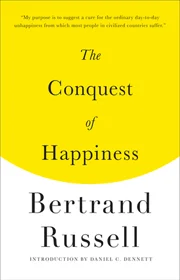
“The Conquest of Happiness” by Bertrand Russell is a guide to leading a more joyful life. Russell explores the meaning of happiness and identifies common sources of unhappiness. He emphasizes the importance of finding fulfilling work and cultivating positive relationships. Written with a blend of philosophy and practical advice, the book offers timeless insights into the pursuit of a content and meaningful life, all while sharing personal reflections to make the journey relatable to readers.
Read The Conquest of Happiness Flipbook:
Listen to The Conquest of Happiness Audiobook:
Title: The Conquest of Happiness
Author: Bertrand Russell
Year Published: 1930
Genre: Self-help, Philosophy
Key Themes:
Definition of Happiness: Russell explains what happiness means and how it involves more than just the absence of sadness.
Causes of Unhappiness: The book identifies common reasons people feel unhappy, such as fear, envy, and boredom.
Importance of Work: Russell emphasizes the value of finding enjoyable and meaningful work, aligning with one’s interests and abilities.
Role of Social Relations: The author highlights the significance of positive relationships in contributing to overall happiness.
Additional Information:
Philosophical Approach: Written by philosopher Bertrand Russell, the book applies deep thinking to the practical pursuit of happiness.
Practical Wisdom: Despite its philosophical roots, the book offers practical advice for readers seeking a more content and meaningful life.
Timeless Relevance: Even though it was written in 1930, the book’s insights remain applicable today, providing enduring wisdom for those navigating modern life.
Holistic Well-being: Russell takes a holistic approach, encouraging readers to consider various aspects of life, from personal relationships to meaningful work, in their quest for happiness.
Personal Reflections: The author shares personal stories, making the exploration of happiness relatable and adding a human touch to the philosophical discussions.